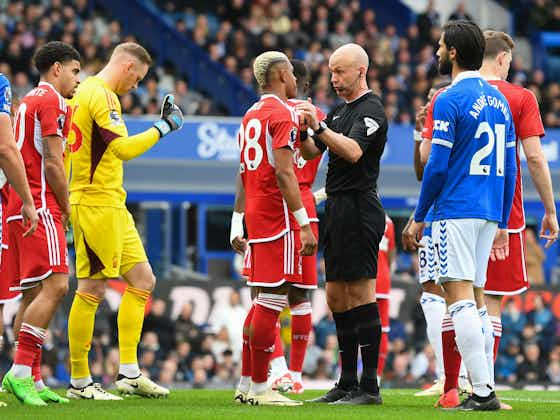EPL Index
·23 April 2024
PGMOL Agree to Release Audio Footage of Forest Incidents

In partnership with
Yahoo sportsEPL Index
·23 April 2024

Nottingham Forest’s request to access VAR communications underscores the growing demand for transparency in Premier League refereeing. Following a contentious 2-0 defeat at Goodison Park against Everton, Forest has been vocal about their dissatisfaction with several penalty decisions.
In a move highlighting their quest for clarity, Nottingham Forest have requested to listen privately to the VAR audio recordings from their recent match. This follows intense scrutiny after the club suffered three rejected penalty claims, which intensified their relegation worries. The club’s official X account voiced strong concerns about the “extremely poor” refereeing decisions that potentially impacted the match’s outcome.
The Professional Game Match Officials Limited (PGMOL) has responded by offering Forest the chance to hear the VAR discussions. This gesture, though keeping with the body’s policy for such requests, stops short of public disclosure. The decision on whether these recordings will be included in the forthcoming ‘Match Officials Mic’d Up’ programme remains pending.
Forest’s statement calls for a broader release of the VAR audio to ensure “full transparency,” advocating that the broader football community and supporters deserve insight into critical match incidents. They highlighted three specific moments involving Ashley Young: a challenge on Giovanni Reyna, a handball, and another challenge on Callum Hudson-Odoi, pinpointing these as pivotal.

Photo IMAGO
This push for transparency is not unprecedented in the Premier League. Liverpool previously made a similar request following a VAR error in their match against Tottenham, leading to a wrongful disallowance of a Luis Diaz goal. That incident, described by PGMOL as a rare “factual error,” heightened discussions around the need for greater openness in decision-making processes.
As the debate over VAR transparency continues, Forest’s proactive stance might set a precedent for how clubs engage with football’s governing bodies on contentious officiating decisions. Whether this will lead to changes in how VAR communications are handled remains to be seen, but it is clear that clubs are increasingly unwilling to leave crucial decisions unchallenged.
Forest’s efforts could pave the way for new norms in the sport, where integrity and transparency are not just ideals but standards upheld across all levels of professional football.






























































